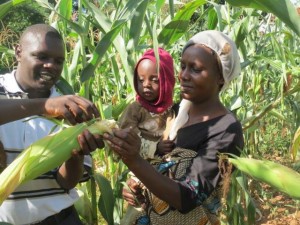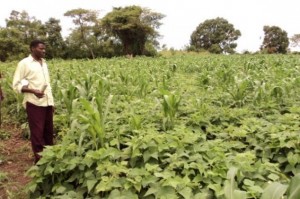The English will say ‘united we stand’. The people of Ketembeyi say ‘agali awamu’. Faced with the challenge of sustainable food supply in a community where more and more people were suffering from or because of HIV/AIDS, the people of Kitembeyi village, in Kiboga district decided to unite, believing as the proverbial saying that it is only when they are united that they can effectively fight the ‘enemy’-AIDS.
Led by 72-year-old Kambazza Emeriko, who is a traditional healer, a group of people who were infected and affected by HIV/AIDS formed themselves into an association-Kitemebeyi Association, Agali Awamu.

Kambazza says the now 35 member group engaged in counselling each other on how to be strong and live positively, caring for the sick, avoid selling of land and to plant food and make some investments their kids would depend on when they died.
As more of the members and his patients got sickly, Kambaza says there was general lack of food to eat in the homes of those suffering from AIDS. Since many of the HIV positive people are the men or women breadwinners in homes, severe sickness meant that they were no longer available to do farming, the almost exclusive source of food in this village, 9kms off the main road.
Yet the sick also needed to eat well- a balanced diet and nutritious foods are always recommended. Also, many of the HIV positive people could not afford to buy the food, since the little money they had was being prioritized on buying drugs for treatment.
“That is why we decided to start a garden for the group. We started growing rice, maize, groundnuts, beans, nakati and we would share the food. Then we decided to add a garden project in each of the members’ homes and have a main garden for the group. The garden and food policy has helped us to treat and support our patients.

Members take food to patients who don’t have food. They just come in our garden and take such patients food, as well as our sick members,” says Kambaza, the chairperson of the association. He says he got the idea after attending training of the THETA, an organisation that brings together traditional healers and medical practitioners efforts in the fight against HIV/AIDS.
Resty Naziiwa from Kibisi LC1, Kyekumbya parish is among the members and head of the group’s garden. “ The garden has helped provide the much needed food. We have been able to join together, plant enough to eat and sell some to get money, which can help us. We have been putting in a lot of effort. We work three days of every week in the group garden and three days in our individual home gardens. We have been planting most crops on rotational basis depending on seasons,” she says.
It is this spirit of hard work and participation that seems to have encouraged THETA to give the group 1.4million shillings to improve and expand the group garden.
 “Members are now very happy to participate because unlike in the past when members would come and work in the group garden free of charge, now we pay some money to those who work in our garden. It has also become an income generating activity as well as providing us with constant supply of food. These days, we even sell some of the food to get some money for emergence to cater for some of the members in case they get severely sick,” Kambaza says.
“Members are now very happy to participate because unlike in the past when members would come and work in the group garden free of charge, now we pay some money to those who work in our garden. It has also become an income generating activity as well as providing us with constant supply of food. These days, we even sell some of the food to get some money for emergence to cater for some of the members in case they get severely sick,” Kambaza says.

The group gardening and food policy has also helped the group members to cater for the over 60 orphans in their different homes. Based on their efforts, THETA gave them two heifers and the members collected money and added on one cow. The cows provide the members with milk, which is mostly given to the most sick/ needy.
Other than providing daily food, the group has demonstrates evidence to show that the food policy has come in handy in this community’s efforts against HIV/AIDS.
“We have found that some of the food can be used as medicine. Like greens, nakati and especially g/nuts. We found that g/nuts are very good for kids who are HIV positive and young kids in general when the g/nuts are prepared fresh from the garden, cooked to near ready. They are very nutritious and boost a patient’s health,” reveals Kambazza.
Salongo Edward Kabenge, one of the members of Kitembeyi Association says that as a result of the group’s efforts to promote good nutrition, constant availability of food and income generating projects, he has started a poultry project, which is helping him eat eggs and raise money regularly. “I have 150 broilers and I get income from the eggs they lay on daily basis. At least I’m assured of that income,” he says.
“I’m among the members seriously engaged in the group gardening. At home, I also grow maize and potatoes. But I’m a widower, HIV positive and sick sometimes so I cant continuously engage in hard work. Yet I have to look after six kids, four of them orphans I got from the group. As a result, I no longer have enough food to sustain the family but the group garden has come in handy because we mainly pick there cassava and maize,” says Regis Bakwatiireki Ateenyi, 48, one of the members this group.
“The chairman (Kembaza) has also given us very helpful herbs. We have drunk and drunk but they need to be boosted by modern medicine for HIV positive people. If only we could get ARVs, we badly need those drugs,” she appeals.

This year the group is studying about beans with different treatments that include use of organic and inorganic pesticides for pest control, organic manure against compost and liquid manure on the side of soil fertility but also assessing the importance of other best practices like line planting, proper spacing, mulching and weeding.
“Our biggest challenge is lack of medicine to treat the sick. I had earlier asked for some medicine so that we have our usual herbs to treat the patients but some modern medicine as well to boost resistance against the many diseases that HIV patients suffer,” Kambazza agrees.
Inability to provide ARVs is one of the challenges facing Kembaza and other traditional healers who have been incorporated in Uganda’s HIV/AIDS fight because of their core role as primary medicine givers to most community members. ARVs are provided at Kiboga hospital to registered patients at the hospital.
“ When members become severely sick, there is no transport to take them to hospital, which is eight miles away. This is another reason we are asking for modern medicine to add to our local herbs so that we can easily treat the patients and be able to take them to hospital before they get worse as we look around for means of transport.”
 While they came together and have grown the maize in big quantities to enable all of them have food to eat now and keep to eat in the near future, the association’s general secretary, Enoch Serunyiko says they are faced with a challenge of maize milling because of the cost of milling and the distance to the nearest maize mill.
While they came together and have grown the maize in big quantities to enable all of them have food to eat now and keep to eat in the near future, the association’s general secretary, Enoch Serunyiko says they are faced with a challenge of maize milling because of the cost of milling and the distance to the nearest maize mill.
“The nearest maize mill is moiré than 6miles away. Milling 20kgs of maize costs one thousand eight hundred shillings (1, 800/=), which many members can’t afford. That is why we are appealing to be helped with a maize-milling machine here so that we solve this problem. Otherwise the food we are growing may end up not being that helpful due to failure to mill it,” says Serunyiko.
But that will not stop them from growing food for now. Ultimate Media visited their group garden, which is about 7 acres. This season they planted maize and cassava while some part is for maize and beans. All evidence of what a united effort (agali awamu) for a good cause can do.
Read more
Nutrition and HIV/AIDS– Webmd

















